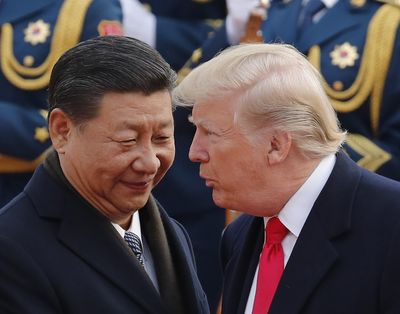China sending envoy to North Korea following Trump visit

BEIJING – Following President Donald Trump’s visit to Beijing, China said Wednesday it is sending a high-level special envoy to North Korea amid an extended chill in relations between the neighbors over Pyongyang’s nuclear weapons and missile programs.
Song Tao, the head of China’s ruling Communist Party’s International Liaison Department, will travel to Pyongyang on Friday to report on outcomes of the party’s national congress held last month, the official Xinhua News Agency said.
Xinhua said Song would carry out a “visit” in addition to delivering his report, but gave no details about his itinerary or meetings. It also made no mention of Trump’s trip to Beijing or the North’s weapons programs, although Trump has repeatedly called on Beijing to do more to use its influence to pressure Pyongyang into altering its behavior.
Song would be the first ministerial-level Chinese official to visit North Korea since October 2015, when Politburo Standing Committee member Liu Yunshan met with leader Kim Jong Un. Liu delivered a letter to Kim from Chinese President Xi Jinping, expressing hopes for a strong relationship, although the respite in frosty ties proved short lived. Vice Foreign Minister Liu Zhenmin visited Pyongyang in October of last year.
China’s Communist Party and North Korea’s ruling Workers’ Party have longstanding ties that often supersede formal diplomacy, even while Beijing has long been frustrated with Pyongyang’s provocations and unwillingness to reform its economy.
China is also North Korea’s largest trading partner and chief source of food and fuel aid, although it says its influence with Kim’s regime is often exaggerated by the U.S. and others. While it is enforcing harsh new U.N. sanctions targeting the North’s sources of foreign currency, Beijing has called for steps to renew dialogue.
Beijing is also opposed to measures that could bring down Kim’s regime, possibly depriving it of a buffer with South Korea and the almost 30,000 U.S. troops stationed there, and leading to a refugee crisis and chaos along its bother with the North.
In Beijing last Thursday, Trump urged Xi to pressure North Korea to give up its nuclear weapons program.
China can fix the problem “easily and quickly,” Trump said in remarks to journalists alongside Xi. He urged Xi to “hopefully work on it very hard.”
“If he works on it hard, it will happen. There’s no doubt about it,” Trump said.
While calling the visit significant, a top Chinese expert on North Korea relations downplayed any connection with Trump’s statements in Beijing, saying it fit a pattern of traditional exchanges between the two parties following significant events such as national congresses.
“Representatives are dispatched to brief the other side at a chosen time and chosen level. It is a tradition and it is unnecessary to connect it with Trump’s visit to China,” said Guo Rui, researcher at the Institute for North Korean and South Korean Studies at Jilin University in northeastern China.
However, he said the visit “shows China’s willingness to see a continuous development of the friendly relations between the two sides.”
“Although the Korean Peninsula situation has been evolving fast with worrisome indications, the two parties are maintaining normal exchanges and that is of significance for stabilizing the bilateral relations and the peninsular situation,” Guo said.
North Korea staged its sixth nuclear test on Sept. 3, detonating what it claimed was a hydrogen bomb, and last fired a ballistic missile over the Japanese island of Hokkaido into the Pacific Ocean on Sept. 15.
Since then, there has been a lull in such activity, leading to some hopes in Beijing that Pyongyang might be responding to international pressure and becoming more amenable to talks.